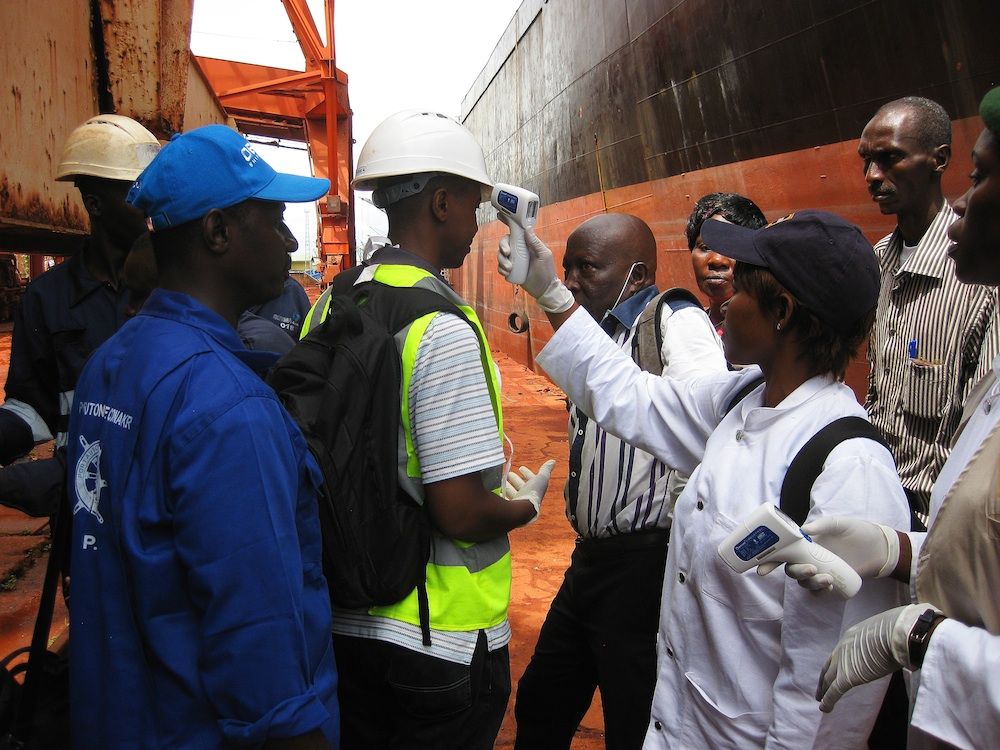Ebola Epidemic: Why a Few Cases Could Threaten Progress

Health officials have made tremendous progress in fighting the Ebola epidemic in West Africa in recent months, but continued efforts are still needed, experts say. That's because the cases that are happening now could be enough to restart the whole epidemic.
Ebola cases in West Africa have, in general, been declining for the past few months. For example, the number of new Ebola cases in Sierra Leone dropped from around 540 per week at the beginning of December to around 65 new cases weekly at the end of January, according to a recent report from the World Health Organization. In Guinea, there was also a drop, from about 150 cases a week in mid-December to 30 cases at end of January. And in Liberia, no new cases have been reported in the past two weeks.
But this is not nearly enough progress to bring the epidemic to an end, said Dr. Daniel Lucey, an adjunct professor of microbiology and immunology at Georgetown University Medical Center, who has treated patients in Sierra Leone and Liberia. Lucey noted that there have been between 50 and 80 new cases per week in Sierra Leone and Guinea for the last six weeks.
"The number of patients each week has been coming down, but it's still far too high," Lucey said. [Where Did Ebola Come From?]
Although health officials are trying to trace all of the people who had contact with each Ebola patient, this "contact tracing" is far from perfect in Guinea and Sierra Leone. As a result, cases pop up among people who officials didn't know were at risk. For example, so far this month, just 14 percent of cases in Guinea occurred among people who were known to have had contact with someone who was sick with Ebola, WHO says.
This "shadow epidemic," which is occurring under the radar, is very worrisome, said Dr. Amesh Adalja, a senior associate and infectious disease physician at the Center for Health Security at the University of Pittsburgh.
If this shadow transmission continues, "it will threaten to cause this whole outbreak to reignite again," Adalja said. "You have to make sure you're finding every case, and stopping transmission in every case."
Sign up for the Live Science daily newsletter now
Get the world’s most fascinating discoveries delivered straight to your inbox.
Getting to zero
Health officials have reduced the spread of Ebola in the current outbreak by employing the same methods used to stop every Ebola outbreak in the past, Adalja said. These methods include identifying contacts of Ebola patients, monitoring them for 21 days, and isolating and treating them if they show symptoms.
But in some ways, it may be more difficult to get to zero Ebola cases in West Africa this time than it was to get the number of new cases down to where it is now, Lucey said. "Stopping the very last chain of transmission of the Ebola virus is proving more difficult" than reducing cases down from the higher numbers, Lucey said.
One reason for this may be because any single case of transmission — whether it be in a rural forest, a slum or seaport — is enough to keep the epidemic going, Lucey said.
Tracing the contacts of every patient is difficult, especially for people who don't have an address, which has occurred in the current outbreak. "If people don't have a fixed address, then how do you find them, and how do you find them every day for 21 days?" Lucey said.
To bring cases to zero, it will be essential for public health officials and health care workers to build trust within the communities, and to communicate with people in ways those people understand.
"Unless the community understands, and trusts the health care system — national and international — then I don't think we're going to be able to get to zero cases, and the virus is going to become endemic," Lucey said. (Endemic diseases are those that are always present, at least in low levels, in a region.)
Ebola vaccine
Two vaccines against Ebola are currently being tested in Liberia and Guinea, and vaccine trials are also being planned for Sierra Leone.
Researchers had planned to enroll about 27,000 people in the vaccine trial in Liberia, but with cases there dropping to zero in recent weeks, there may not be enough cases of the disease to properly test the vaccine's effectiveness, according to Time. Researchers are now discussing whether to move the trial to Guinea.
Although Ebola cases are declining, it's important to keep testing the vaccines, because they will be valuable for future outbreaks, and may even be needed to stop the current outbreak, Lucey said.
"I don't think we should assume that this outbreak is going to be over in the next few months or even this year," Lucey said. "I hope that it is, but I won't be surprised if it's not gone."
Lucey noted that the outbreak in Liberia will not be declared over until the country has been without an Ebola case for 42 days, and that it's possible that people with Ebola could cross from Guinea or Sierra Leone into Liberia again.
It's also important to continue to conduct studies on antiviral drugs and antibody-based treatments that could help people who get Ebola, Lucey said.
Follow Rachael Rettner @RachaelRettner. Follow Live Science @livescience, Facebook & Google+. Original article on Live Science.

Rachael is a Live Science contributor, and was a former channel editor and senior writer for Live Science between 2010 and 2022. She has a master's degree in journalism from New York University's Science, Health and Environmental Reporting Program. She also holds a B.S. in molecular biology and an M.S. in biology from the University of California, San Diego. Her work has appeared in Scienceline, The Washington Post and Scientific American.










